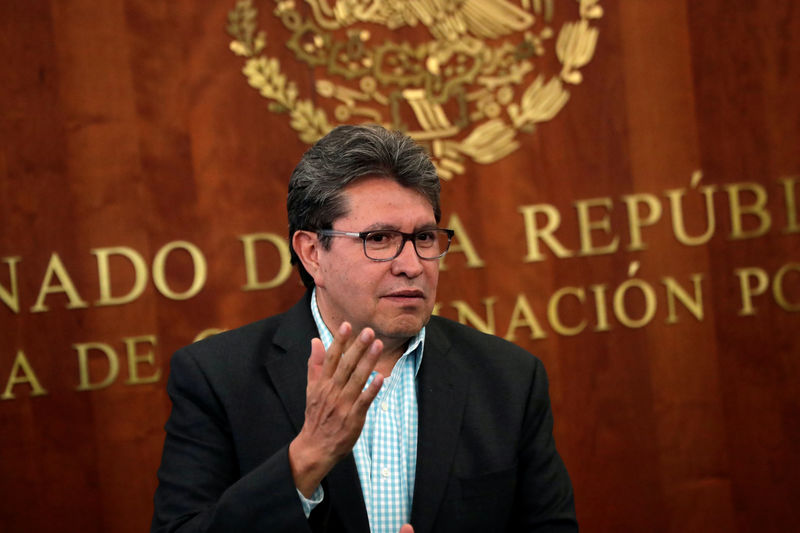By Diego Oré
MEXICO CITY (Reuters) - Mexico's Senate aims to pass a first raft of bills to regulate fees for financial services by the end of October, said Ricardo Monreal, Senate leader of the ruling National Regeneration Movement (MORENA) party.
Last November, shortly before President Andres Manuel Lopez Obrador took office, MORENA lawmakers presented a bill to limit bank fees, sparking an investor backlash that pummeled the peso , Mexico's S&P/BMV IPC stock index and banking shares.
The bill, which is sponsored by Monreal, has since then been wrapped up in negotiations with Mexico's central bank, the finance ministry and Mexico's banking association (ABM).
In "two weeks (we'll) pass an initial package of initiatives," Monreal said in an interview with Reuters on Monday. "We're going step by step," he added, saying the first group of bills would change 32 articles and three laws.
If approved by the Senate, the package would pass to the lower house. MORENA and its allies hold big majorities in both.
The planned changes mostly relate to transparency and including more Mexicans in the banking system, which is in banks' interest, Monreal said.
"There is resistance," he added. "But I think (banks) have understood ... they must reduce these sorts of charges," a reference to fees in general.
His plan includes a proposal that banks exempt accounts smaller than 18,700 pesos ($970) from certain fees, as well as free up such accounts from other charges.
A study by financial products watchdog Condusef said 30% of Mexican banks' revenue on average comes from their fees, which Monreal called "among the highest in the world."
The ABM represents banks such as BBVA (MC:BBVA), Santander (MC:SAN), the Mexican unit of Citigroup (N:C), Grupo Financiero Banorte (MX:GFNORTEO), and billionaire Carlos Slim's Grupo Financiero Inbursa (MX:GFINBURO).
Separately, Monreal, a 59-year-old veteran of Mexican politics, said Congress will by Oct. 20 approve a proposal to apply a value-added tax on digital businesses. The VAT rate at Mexico currently stands at 16%. Under the initiative, companies such as Amazon (O:AMZN), Uber (N:UBER) or Google (O:GOOGL), will be responsible for paying the tax, the senator said.
"They have to pay without hitting the consumer. From what they make now," he said. "It would be very easy to charge the consumer for it. They have to absorb it as part of their costs."

The initiative also obliges platforms such as Netflix (O:NFLX) to produce at least 30% worth of their Mexico programing within the country, said Monreal.